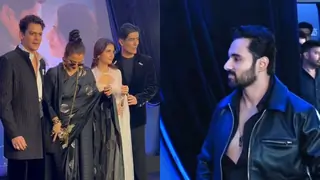Folks,
I do not know about you, but for me, the abiding image after yesternight's turbulent episode, that eddied and swirled with violent emotions and violent reactions, was not that of Jalal kneeling on the floor of his chamber, throwing his head back, and screaming in unrestrained, gut wrenching anguish: Aapne hamare saath aise kyon kiya, Badiammi ?, even as images of a happier, more gentle past with her, and others of her braving cannon fire to rescue him from certain death, flash across his mind.
Jalal & Rahim: Nor was it the incredibly charming scene where Jalal, with a grasp of child psychology that would have done a naanijaan proud, and is astonishing in a youg man who is a warrior and an emperor, and who does not even have a niece or nephew, coaxes Rahim's tale of the dibbi out of him at long last.
When he tells the child, perched cosily in his lap, Aapki Chotiammi ko aapke aapas ki baatein humein nahin bataani chaahiye thi, I applauded vigorously, for his unerring, gentle understanding of what was really bothering Rahim was amazing. Then the other dibbis from Altaf Qadri's shop, as a test for Rahim's identification of the fatal one, the promise of a multitude of toys, and the vital assurance that Rahim would not be punished in any way.
It is thus that Rahim, ensconced in his ataliq's lap, and encouraged by his mother to tell the truth, is finally persuaded to unburden himself.
I am, right now, not going into the impact of that truth on Jalal's psyche. I knew it would shatter him and it does. When he says to himself, bitterly, Mere hi saaye ne mere peeth mein chura bhonk diya, the full agony of this betrayal, by the one he loved above all others and trusted above all others, stands fully revealed. As we watch Jalal walking thru the palace corridors after leaving Salima's rooms, his face a mask of misery and his shoulders hunched as if under a sudden burden too heavy even for him to bear, the depth of the trauma is laid bare.
Let us rather consider what the way Jalal handles Rahim reveals about Jalal himself. He is able to look at the whole matter from the child's perspective, peep into the child's mind, guess what is troubling him, and then find a way to calm those fears convincingly, and all this without alarming Rahim in the least.
When contrasted with the way in which Jodha, a very kind person in general and extremely affectionate towards Rahim, and moreover one who is used to children, bombards him with leading questions and stampedes him into angry flight, Jalal's rating goes much higher.
The comparison also proves a point I have reiterated in the past. No one can accuse Jodha of being over imaginative, for she has no imagination. She cannot put herself in the place of another person and try to think as he would think, and this whether is is Rahim, whom she loves, or Jalal, whom she professes to hate.
Whereas Jalal, the quintessential alpha male, a species not generally known for its sensitivity, and moreover one who constantly advertises his heartlessness, can get effortlessly into the heart of a four year old and win the child's trust. What does this say about him?
To revert, nor was it the scene that follows, with the slow changes in Jalal's face as Rahim proceeds with his story of how he found the dibbi. It is as if the features are being crumpled, one layer at a time, by the hand of fate, as the depth of the betrayal sinks into his zehen.
Jalal-Salima: Nor the last exchange between Jalal and Salima, as he rises to leave, and asks her, simply, Salima Begum? There are different kinds of bonds, and the one between them, based on their shared love for his Khan Baba, is such that no explanations are needed. When she assures him that his secret will go with her to the grave, Jalal attempts a smile of grateful acknowledgement that does not quite come off. The weary sadness in his face and his eyes tugs at her heart, as it does at ours, as he inclines his head wordlessly and leaves.
Mahaam Anga & Adham: No, it was none of the above high points, though each, in its own way, put us thru an emotional wringer.
It was the moment when Mahaam Anga, her mouth working and her kohl-rimmed eyes ablaze with the light of near madness, assures her frantic son that they are going nowhere, that nothing will happen to either of them, that she wants to see what Jalal will do, adding, Aage aage dekho hota hai kya.As Adham looks on in despair, his normally rough, brutal face now like that of a frightened child, she rises to her feet and turns away from him.
Sharbat piyo!
My skin literally crawled at the sound of those two little words. Was this a Lady Macbeth, as Stargirl would have it, confident that evil will prevail ? Was she a witch from centuries past, now reincarnated, and sure that the forces of darkness she has placated will see her thru this crisis ? Or was it something else? The last weapon of an intrigante sans pareille, a mistress of intrigue, incomparable in her deadly skill at weaving webs of deceit and betrayal?
Mahaam moves to another room, adjusts her cowl in front of a huge mirror in the light of a mashaal, then opens a secret door behind that mirror (there seems to be no special hidden latch, no key, nothing. So how this door remained a secret in the terminally nosy rabbit warren of the Agra palace is an even greater mystery than that of Mahaam's unshakeable self-confidence). She pushes open yet another whitish door that lies behind, turns back to us, and intones ominously Waqt aa gayaa hai. End of scene.
A totally paisa vasool scene, as they say of the movies. A cliffhanger of an ending, guaranteed to push BP levels across the forum to dangerous heights. My blood pressure is chronically low, and then again, I am not going to drive myself nuts in frenzied, and ultimately fruitless speculation.
Maybe, just to justify those heavy handed references to Mullah Beqazi, a humshakal of the Emperor Humayun, that were pushed into our faces by the CVs, like a conjuror proferring a card during a card trick, Mahaam has an unfortunate humshakal secreted behind that tinny looking white door. Maybe she is going to produce her that night at the gathering where Jalal, in the precap, proclaims his Badiammi to be the murderer of his unborn child , shoves her to the floor and screams his heart out at her: Kyon kiya aapne aise? Maybe.
But why fret unnecessarily for all of 3 long days till Monday night? Let us chill, and await developments. While we do so, it is interesting to note that when alerted by the ever faithful Resham to the impending danger that threatens his Ammijaan's life, all that the son for whom she has betrayed her very soul can think of is that his own mustaqbil (future) will be destroyed if she is caught and punished. So much for fiial love! Poor Mahaam, though this might see m a strange thing to say of a murderess and a traitor.
Jodha: I have already noted her lack of imagination. As Jodha and Moti give each other high fives and rejoice, understandably, that Shahenshah ki aankhon ki patti khul gayi!, I would have been pleased if she could have added just one little sentence that marked her understanding of what this crushing blow would mean for Jalal. After what she has learnt of the horrors of his childhood, and the roots of his unshakeable faith in and love for his Badiammi, I would have expected a woman as intelligent as Jodha to have been able to grasp the depth of his grief at this betrayal.
The contrast with Salima's face, that mirrors the gathering clouds of grief and despair on Jalal's as Rahim proceeds with his tale, is striking.
To forestall a torrent of legitimate complaints about the atrocious way in which Jodha was treated by Jalal during the affair of the dature ka ark, and why then should she feel the least bit sorry for his present plight, let me add the following.
I do not say that Jodha should sympathise or empathise with Jalal over this brutal shock he hea suffered. But she should be able to understand it as an analyst would understand it. That would show her intelligence and her ability to set her personal emotions aside when analysing a situation. This is precisely the need to set aside sambandh and moh when seeking the truth, as she herself advises Jalal. The sambandh can be good or bad, and the maxim applies to her as much as it does to Jalal.
But Jodha gives no inkling of any such understanding, at least as of now.
Secondly, it is not as though she does not care what happens to her vivekheen patidev. In fact, as I had noted 2 days ago in my Changing Equations post, about her sudden declaration of her being Jalal's shubchintak, and her railing about how Mahaam did not love him as he loved her, that those close to the Shahenshah were there only to exploit his power, the facts seem to point in the opposite direction!😉
To revert, Jodha also seems quite incapable of understanding what Bharmal explains so clearly to his family today, that Ratan Singh, who sponsored dacoits who preyed on the common people, was a totally undesirable husband for Sukanya. She never even thinks on those logical lines.
But there was one curious and revealing glimpse of Jodha last night, which was pointed out by Lashy. While exulting in her deduction that the Shahenshah had gone to the bazaar in disguise to seek sakshya about the case, she also wonders whether, at least now that he has heard the full truth from Rahim, he would, finally, believe her, Jodha, or whether he would once more forgive Mahaam Anga. Her desire that he should believe in her is clearly not in accord with her professed ghrina for him. But then, this is hardly news for us, right, folks? 😉
Jalal-Mahaam: I had argued yesterday on Mansi's thread that contrary to those who felt that he would hesitate about punishing Mahaam, I was convinced of the contrary. Let us take the ehsaan angle first. Jalal owed even more to Bairam Khan than to Mahaam, but when the crunch came, and he was seen as to usurp the Shahenshah's authority, Jalal was finally ready to do battle against him.
What Mahaam Anga has done is infinitely worse. It is a vile crime against the emperor and the empire, for personal gain.Bairam Khan never had any personal agenda, he simply believed that he knew better than the young and inexperienced Jalal, and was becoming too dictatorial. I am sure you see the difference.
































372